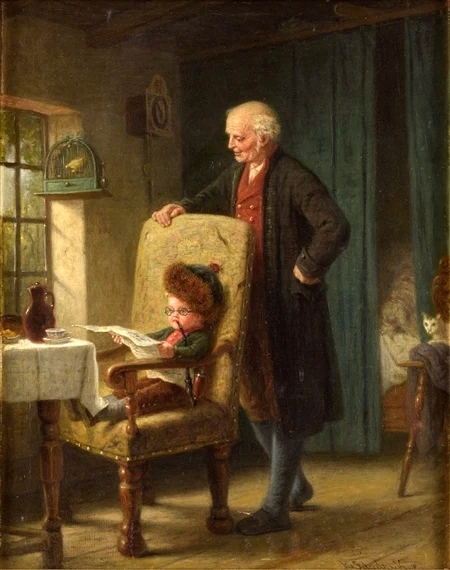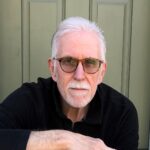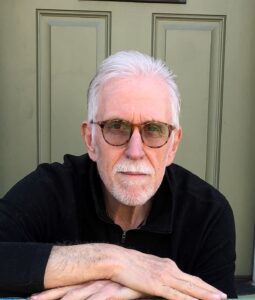If May is the “Hallmark Holiday” month for mothers, June belongs to fathers. The sentimentality associated with these contrivances nevertheless evokes the power of our connection to parents, for good or ill. My own father has been dead for decades now, yet our relationship has continued to shape, define, and indeed, haunt me. Why write about it now?
I am in my 72nd year of life; the same age he was when he died in 1990. Men often reflect on their relationship with their fathers during these coincidences of milestones; a similar thing often happens when a son reaches the age his father was when the son was born. Considerations of, “Will I live longer than he did?” seem common. This is certainly a theme that often comes up in the course of psychotherapy.
My father’s death didn’t occur unexpectedly, but I still recall it often. Seriously ill for several years with numerous systemic and chronic illnesses, he suffered from heart disease and esophageal cancer, which required a laryngotomy and use of one of those devices held to the side of the neck that produces robotic-like speech. After a lifetime of heavy smoking, common to his generation (arguably, the “greatest one”), he quit on the day he received his cancer diagnosis. A little too late.
While the results of the cancer surgery were obvious, the heart disease was not; I later learned from his friends that he did not want me to hear about the many painful symptoms that he struggled with daily, for fear that he would be impose a burden on my life. This deeply embedded sense of independence characterized many of his generation. One consequence of this would be an unexpected phone call: “I’m in the hospital.”
The first of these came after he had undergone throat surgery, and I realized that I would never hear his natural speaking voice again; only the artificial device-enabled sounds would remain, a facsimile of speech. I had no idea that he had been scheduled to be in the hospital or the severity of the diagnosis.
The second and final call came two years later, after he had undergone triple bypass surgery and on the fourth day of my new job as a psychiatric social worker. Once again, I had no idea that his cardiac condition had deteriorated to the point where hospitalization, much less surgery, would be required. Despite his many systemic health issues, he had never seemed frail, always appearing strong in stature and robust in spirit. Until now. The man I saw in the hospital bed, three days post-op, was weakened by his condition, the long incisions on his legs, ankles to groin, used to procure veins for the bypass procedure, easily and discomfortingly visible as he lay quietly, ostensibly asleep.
He was only resting and quickly recognized me entering the room. I recall a few minutes of the usual talk—“How are you doing, Dad?”—and then a moment in time freezes my memory. I sat on the side of the bed and helped him up beside me. We both said a few words, who knows what. He was in mid-sentence when he went silent, slumped onto my shoulder, and was gone. Instantly. Without groans, protests, or whimper. Nothing. I cannot remember the words he said, only that they were not of a permanence one might have wished for.
The next minutes to hours were a blur of what appeared to be a platoon of nurses and doctors rushing bedside to attempt revival, but I knew he was gone. I was left alone in the room for what seemed to be only minutes before a kindly but firm nurse informed me that his body would be taken to the morgue and funeral arrangements would need to be made. I remember first seeing her as I was muttering something about the shiny red wagon he had built for me as a child.
This I know about him: he was one of eighteen (yes) children born to a Pittsburgh family of first-generation German immigrants. He entered the family in the year 1918, the same year the US was ravaged by what became known as the “Spanish flu” epidemic, which claimed the lives of several of his siblings but left me and many cousins with a long line of loving and doting aunts and uncles. I am an only child.
After dropping out of high school (the circumstances of which were never quite clear, but early on I remember him saying he “punched out” a teacher), he was drafted into the Army in 1941 and became a gunnery sergeant at Ft. Benning, Georgia, for the duration of the war. He married my mother that year. He did not raise his voice or a finger in anger toward me or anyone, ever.
My father held several jobs that I recall but was a woodworker at heart who could, without written measurements or dimensions, craft and build a piece of furniture seemingly with his eye alone. I would watch in awe as he cut lumber and assembled the puzzle pieces of end tables, coffee tables, and the like, for friends and family. I was five years old when he worked for a time as a rough carpenter building the Conway Railroad Yards outside of Pittsburgh. He took me to the jobsite one day and showed me how to drive a nail into wood. As if a moment ago, I can remember him saying, “Now when you grow up you can say you helped build the Conway Railroad Yard!”
While he surely wanted me to assimilate his mastery with wood, I never quite got it. I could see that this disappointed him when I preferred books to learning his craft. And yet, consistent with his generation, he often said that “working with your hands” was less desirable and somehow less admirable than “getting educated,” and he supported me being the first, along with several cousins, of our generation to receive a college education, though he never quite understood how studying psychology would be of any benefit. An apparent paradox: the thing I most admired about him, he devalued himself. But yet again, he was a master of language and grammar and always corrected my most minor errors in syntax, owing to his desire to see me succeed beyond his reach.
I never heard my father utter a vulgar word or take a drink of alcohol, while my mother descended into a slow death of alcoholism and depression. I also never heard or saw him have a direct conversation or exchange of words with my mother, as they were estranged throughout my childhood and adolescent years and subsequently divorced when I was in my early 20s. I remember intimations of infidelity on both sides but later questions to confirm if either was without sin were left unanswered. When one lives in arguably unusual, if not abnormal conditions, one may not recognize its dis-ease until a more objective perspective develops. This was evidenced by the fact that, until the day I left home for college, my father and I shared a bedroom with twin beds while my mother slept alone in her own room. The impact of that dynamic still lives with me today in ways I’m sure I am not fully conscious of.
After their divorce in the mid-1970s he lived alone in a small second-floor apartment until his death. We spoke several times a week, occasionally shared dinner, and celebrated each other’s birthdays in a perfunctory way. I would often have to press him to be specific about any health concerns. My mother often commented that the most singular common trait I “inherited” from him was my “German stubbornness”; I cannot disagree.
Sigmund Freud adopted themes from Sophocles’ Oedipus tale to develop his theory of psychosexual development: between the ages of three and five the male child engages in a fierce rivalry with his father for the affections of his mother, eventually “resolving” in the child’s identification with the father, paving the way for a more complete developmental journey. (The female child’s version of this process is known as the Electra Complex.) While Freud’s theory still carries the weight of “gospel” for some and is considered quaint Victorian-era fantasy for others, the core idea that men ultimately carry the imprint of their father’s history, temperament, and conveyed role modeling is evidenced by the power of these memories and their currency in a son’s psychological world.
Well into my professional career as a psychiatric social worker and psychotherapist, my father could never quite comprehend how one made a living “just talking to people.” One time I tried to put it this way: “I try to create with words what you create with your hands,” but he never quite got it.
Image Credit: Emil Gottlieb Schuback, “Father” (unknown) via Collections – GetArchive






1 comment
Patrick Pellerin
My mom and dad divorced prior to my 2nd birthday in 1972. I have no memory of the 3 of us together. Not even a family picture exists. The one baby picture I can remember which may have been of the 3 of us, has one person cut out. I never questioned it though. I just kind of knew.
Comments are closed.